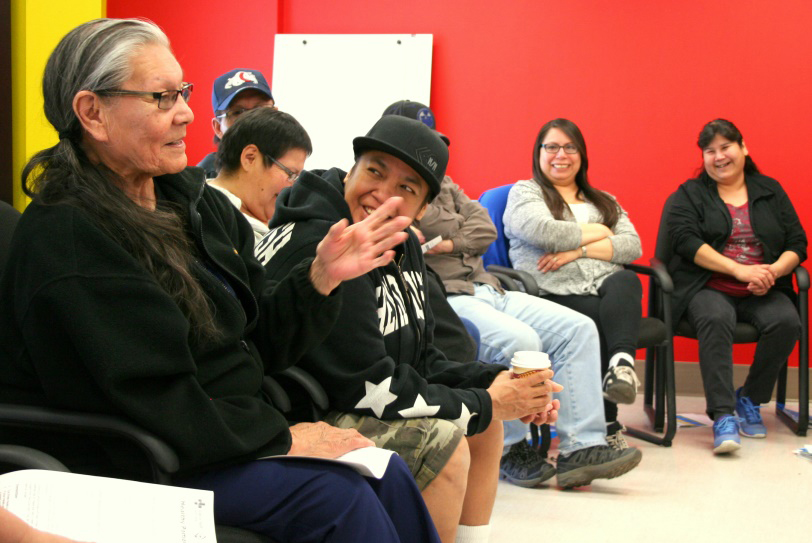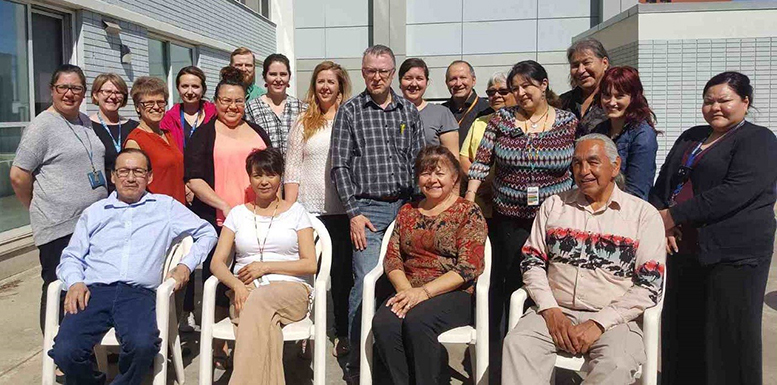By Laura Mushumanski
(ANNews) – The literal translation in Plains Cree for diabetes is sugar sickness (sôkâwâspinewin), and when eating too much of the ‘good stuff’ starts wreaking havoc on a person’s body, the Indigenous Wellness Clinic (IWC) in Edmonton, Alberta offers diabetes support for our Indigenous brothers and sisters.
The Indigenous Wellness Clinic is located east of the Royal Alexandra Hospital on the second floor in Anderson Hall. IWC is affiliated with Alberta Health Services, and with a provincial health care number, IWC won’t be sending you a bill in the mail. Indigenous patients have the opportunity to participate in IWC’s culturally supported diabetes education program: the Indigenous Wellness Program. The program blends the knowledge of both western medicine and traditional Indigenous teachings, by taking a holistic healing approach to Indigenous health and wellness.
Around 20 years ago, when everyone was purchasing generators for Y2K, a group of Elders came together to initiate a culturally appropriate education program for diabetes. The Indigenous Wellness Program welcomes those seeking support without making anyone feel like they should be wearing a dunce hat. Since the start of the new millennium, IWC has been expanding on their services. To date, the IWC family includes five family physicians, two part-time specialists (diabetes and obstetrics/gynecology), a physiotherapist, dietician, nurses, and cultural helpers (social work and mental health). The health and well-being of Indigenous people are important to IWC and can offer support to Indigenous people living in Edmonton, Northern Alberta and the Northwest Territories.

An intake group interacting during one of IWC’s diabetes education sessions. (File photo 2019).
The dietician at IWC, Jane Jensen, is largely involved in the monthly four-day diabetes retreat, the Indigenous Wellness Program. In order for anyone to talk about their sweet tooth in a group setting, there is an initial patient intake. Clients first engage in a one-on-one meet and greet with the diabetes specialist, nurse and then dietician. Following the client’s confession about their midnight walkabout to fetch a pint of Ben and Jerry’s, they are registered on a longer than anticipated wait list. The waiting list, ranging from six-months to a year, seems to demonstrate the much-needed cultural support for Indigenous health and wellness.
The approach that Jane takes to understanding an Indigenous person living with the diabetus is listening and treating the entire person as a whole, as opposed to only acknowledging the illness. Jensen acts as a sounding board by taking her time to listen to anyone who walks through the Indigenous Wellness Clinic’s doors. She listens with compassion, by understanding where a person is in their life, their personal experiences, what may be inhibiting them from accessing basic needs, what is affecting their personhood, and what kind of support they are looking for.
When the participants are being asked, “how are you coping with diabetes?” one of the most important messages that Jane emphasizes is that “diabetes is only a small part of who you are.”
Jensen’s shared observation on Indigenous people’s dietary practices, states that “most Indigenous people love their meat . . . vegetables – not so much. If vegetables are less consumed, it is not the end of the world, there are different approaches to healthy eating and lifestyles.” One of the different approaches she acknowledges and enables is using the medicine wheel to support realistic goals, and healthy dietary options for each patient by taking their physical, emotional, spiritual and mental health into account.
The no blame, no shame mentality is on Jane’s forefront. She states that, “there is a good reason for Indigenous people to feel upset about their relationship to food and health,” when thinking about historical trauma among Indigenous populations within Canada, unreliable food sources from negative impacts on the natural environment, and an Indigenous person’s relationship with food during their childhood.
The interactive learning environment that is provided during a patient’s all inclusive, four-day stay at Anderson Hall, also encourages patients to bring a family member for moral support. Meals and housing accommodations are provided during the four-day education program. And traditionally, there is an interactive hands-on cooking session with Jane, where patients make bullet soup and fibrous whole wheat bannock that will sort out any plumbing issues.
The IWC staff involved in the intensive diabetes education program provide a sense of support and not feeling alone. The program includes interactive sessions about healthy eating, food and blood sugar levels, food label reading, as well as nutrition and nursing presentations: what is diabetes, diabetes medications and diabetes complications. There also is a cultural aspect on diabetes and health, and a physical activity component that includes specific exercise and stretching techniques.
At the Indigenous Wellness Clinic, Jensen’s own experience with the staff has been a humbling one for her, stating that, “it is an honour to be part of a group that is willing to let me learn alongside them.” The staff are known to be respectful, practice inclusion, form kinships with their patients and treat everyone as invaluable. Jensen also incorporates the same ideologies by not undermining the reality of an Indigenous person’s hardships and how that has directly impacted their overall health and wellness.
Anyone seeking diabetes information, support, or nutrition inquiries can contact Jane Jensen via email: [email protected], or by phone: 780-735-4512.
The Indigenous Wellness Clinic offers various services relating to health-related issues and concerns. Staff includes: family doctors, diabetes specialist, registered nurses, mental health workers, a physiotherapist, and cultural support workers. Additional information about IWC can be found online on Alberta Health Services website.
IWC staff is available during COVID-19, by phone: 780-735-4512, (toll free: 1-844-441-4512), or e-mail: [email protected]; Monday to Friday, from 8 a.m. to 4:15 p.m.
Laura Mushumanski is a Local Initiative Reporter for Alberta Native News.



Be the first to comment on "Sugar Sickness is viewed as a small part of our identity"